高中英语省略句讲练.
高考英语近三年真题语法精讲精练:专题9-省略句和强调句
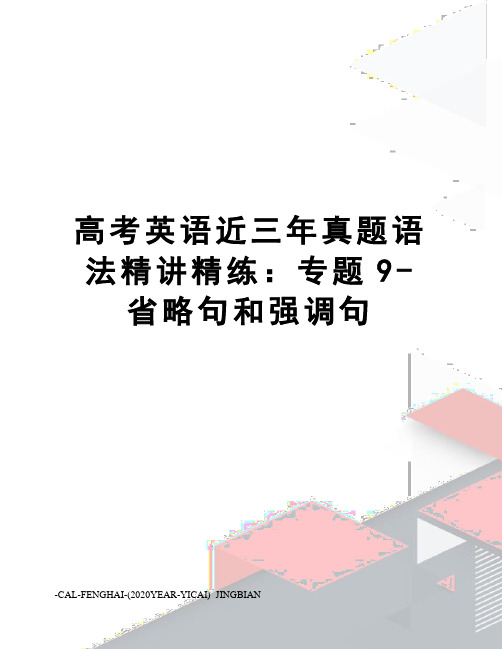
高考英语近三年真题语法精讲精练:专题9-省略句和强调句-CAL-FENGHAI-(2020YEAR-YICAI)_JINGBIAN专题省略句和强调句一、省略考点一不定式中的省略1.感官动词或使役动词(feel,notice,see,hear,let,make,have等)后接不定式作宾语补足语时常省略to。
I heard my father sing in the kitchen.2.在由and或or连接的并列不定式结构中常省略后面的to。
I want to finish my homework and go home.3.在某些形容词(如:glad,happy,pleased等)后面时常保留to而省略上文已提到的动词原形。
—Will you join us in the game?—I'd be glad to.4.在do nothing but,can't help but,why not,would rather...than...,had better等句型中省略to。
The little boy could do nothing but cry.5.to后的内容常承前省略(只保留to即可)。
但如果承前省略的不定式中有have或be的任何形式,后应该保留原形be或have。
Susan is not what she used to be.考点二定语从句中的省略1.在限制性定语从句中,如果关系代词that,which,whom作从句中的宾语,可将关系代词省略。
Do you know the man (whom) our teacher spoke to?2.先行词the way(关系词作状语),time(次数)后的定语从句常省略关系词。
I don't like the way(in which/that) he spoke to others.I can't remember how many times (that)I have failed.考点三状语从句中的省略1.当状语从句的主语和主句的主语一致且从句谓语动词含有be时,可省略状语从句的主语和be动词。
高中英语语法-省略句。吉林油田高中朱雪燕
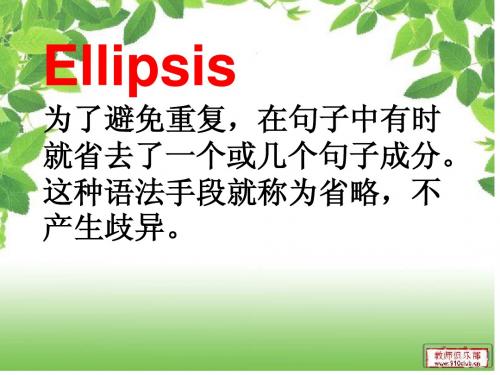
• 5.动词不定式的省略 • 1)She asked me to dance with her, but I didn’t want to (dance with her). • --Will you go with me? • --Well, I’d like to (go with you). • 总结:1. 为避免重复,常省略上文已提到的
• 助动词的省略。 • (Does) Anyone want a drink? • I suggest that we (should )have a class meeting to discuss the plan.
• 2. 在祈使句中 • (You) Open the door, please. (You’d) Better take an unbrella. • 3. 在感叹句中 • What a good boy (he is)! • What a fine day (it is)!
• What surprised me was not what he said but ________ he said it. (NMET 2004湖北卷) • A. the way B. in the way that • C. in the way D. the way which
(三)宾语从句中的省略 • 1.We all know (that) light travels faster than sound. • I hope (that) you’ll be fine soon. • 1.引导宾语从句的连词that常被省 略,但多个宾语从句并列时,通常 只省略第一个that
• The man we followed suddenly stoped as if to see whether he was going in the right direction. • He acts as if (he were) a foo (she was)angry.
高中英语省略句用法详解及练习
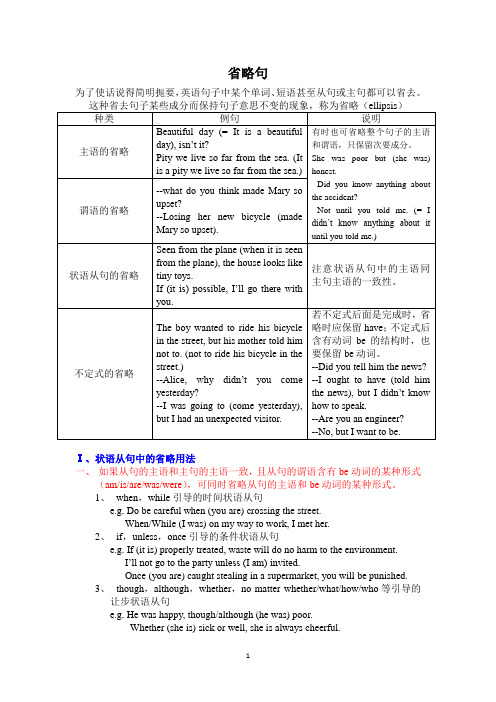
省略句为了使话说得简明扼要,英语句子中某个单词、短语甚至从句或主句都可以省去。
Ⅰ、状语从句中的省略用法一、如果从句的主语和主句的主语一致,且从句的谓语含有be动词的某种形式(am/is/are/was/were),可同时省略从句的主语和be动词的某种形式。
1、when,while引导的时间状语从句e.g. Do be careful when (you are) crossing the street.When/While (I was) on my way to work, I met her.2、if,unless,once引导的条件状语从句e.g. If (it is) properly treated, waste will do no harm to the environment.I’ll not go to the party unless (I am) invited.Once (you are) caught stealing in a supermarket, you will be punished.3、though,although,whether,no matter whether/what/how/who等引导的让步状语从句e.g. He was happy, though/although (he was) poor.Whether (she is) sick or well, she is always cheerful.No matter how/However hard the task (is), we must fulfill it in time.(注:从句的主语和主句的主语不一致时,只省略从句中的be动词形式)4、as if,as though引导的方式状语从句e.g. He rubbed his eyes and yawned as if/though (he was) waking up after along sleep.He stood up as if/though (he wanted) to leave.(as if/though + to do表示一个将来的动作)二、than,as引导的比较状语从句中的省略用法:当不同的主语进行比较时,一般省略从句中的谓语;当从句中的主语与谓语(be动词除外)和主句中的主语与谓语相同时,通常省略从句中的主语和谓语,只保留比较部分。
高中英语省略句及练习讲解
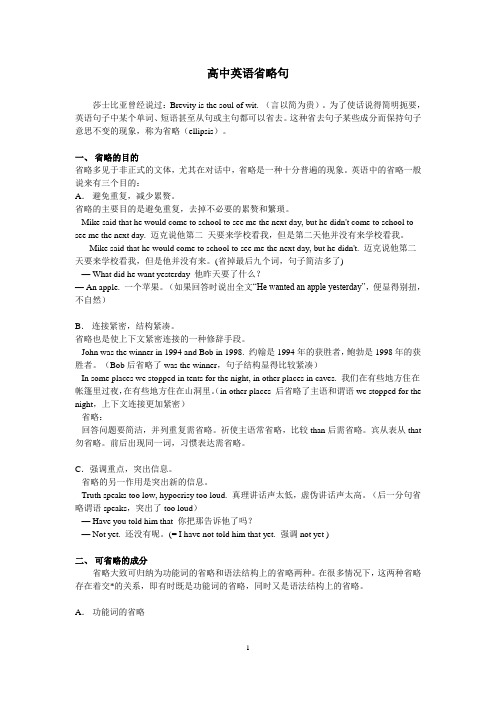
高中英语省略句莎士比亚曾经说过:Brevity is the soul of wit. (言以简为贵)。
为了使话说得简明扼要,英语句子中某个单词、短语甚至从句或主句都可以省去。
这种省去句子某些成分而保持句子意思不变的现象,称为省略(ellipsis)。
一、省略的目的省略多见于非正式的文体,尤其在对话中,省略是一种十分普遍的现象。
英语中的省略一般说来有三个目的:A.避免重复,减少累赘。
省略的主要目的是避免重复,去掉不必要的累赘和繁琐。
Mike said that he would come to school to see me the next day, but he didn't come to school to see me the next day. 迈克说他第二天要来学校看我,但是第二天他并没有来学校看我。
-- Mike said that he would come to school to see me the next day, but he didn't. 迈克说他第二天要来学校看我,但是他并没有来。
(省掉最后九个词,句子简洁多了)— What did he want yesterday 他昨天要了什么?— An apple. 一个苹果。
(如果回答时说出全文“He wanted an apple yesterday”,便显得别扭,不自然)B.连接紧密,结构紧凑。
省略也是使上下文紧密连接的一种修辞手段。
John was the winner in 1994 and Bob in 1998. 约翰是1994年的获胜者,鲍勃是1998年的获胜者。
(Bob后省略了was the winner,句子结构显得比较紧凑)In some places we stopped in tents for the night, in other places in caves. 我们在有些地方住在帐篷里过夜,在有些地方住在山洞里。
高考英语省略句讲解课件

• The police found that the house had been broken into and a lot of things had been stolen. • One of the sides of the board should be painted yellow, • and the other should be painted white.
(二)并列句中的省略 两个并列分句中, 两个并列分句中,后一个分句常省略与前 一分句中 相同的部分。 相同的部分。 e.g. My father is a doctor and my mother (is) a nurse. I study at college and my sister (studies) at high school. They don’t agree with you, neither do I. 他们不同意你的意见,我也不同意。 She was poor but (she was) honest. 她贫穷但很诚实。
•
(2)当从句主语是 It,谓语动词有含有系动词 时,可 当从句主语是 谓语动词有含有系动词 谓语动词有含有系动词be时 可 系动词be一起省略 以把 it系动词 一起省略。此时构成连词( if , 系动词 一起省略。此时构成连词( unless, when, where, whenever) , ) +possible/necessary的结构。 的结构。 的结构 Unless(it is )necessary,you’d better not ( , refer to the dictionary. Fill in the blanks with articles where (it is) necessary. If possible, bring me a pair of gloves.
高中语法省略讲解及练习无答案
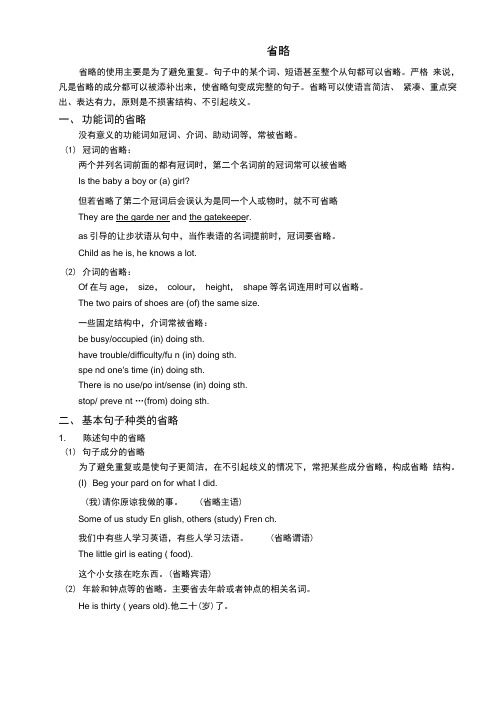
省略省略的使用主要是为了避免重复。
句子中的某个词、短语甚至整个从句都可以省略。
严格来说,凡是省略的成分都可以被添补出来,使省略句变成完整的句子。
省略可以使语言简洁、紧凑、重点突出、表达有力,原则是不损害结构、不引起歧义。
一、功能词的省略没有意义的功能词如冠词、介词、助动词等,常被省略。
(1)冠词的省略:两个并列名词前面的都有冠词时,第二个名词前的冠词常可以被省略Is the baby a boy or (a) girl?但若省略了第二个冠词后会误认为是同一个人或物时,就不可省略They are the garde ner and the gatekeeper.as引导的让步状语从句中,当作表语的名词提前时,冠词要省略。
Child as he is, he knows a lot.(2)介词的省略:Of在与age,size,colour,height,shape等名词连用时可以省略。
The two pairs of shoes are (of) the same size.一些固定结构中,介词常被省略:be busy/occupied (in) doing sth.have trouble/difficulty/fu n (in) doing sth.spe nd one's time (in) doing sth.There is no use/po int/sense (in) doing sth.stop/ preve nt …(from) doing sth.二、基本句子种类的省略1. 陈述句中的省略(1)句子成分的省略为了避免重复或是使句子更简洁,在不引起歧义的情况下,常把某些成分省略,构成省略结构。
(I) Beg your pard on for what I did.(我)请你原谅我做的事。
(省略主语)Some of us study En glish, others (study) Fren ch.我们中有些人学习英语,有些人学习法语。
第16讲:省略句的讲稿高中英语语法讲解习题 高三二轮复习 学案
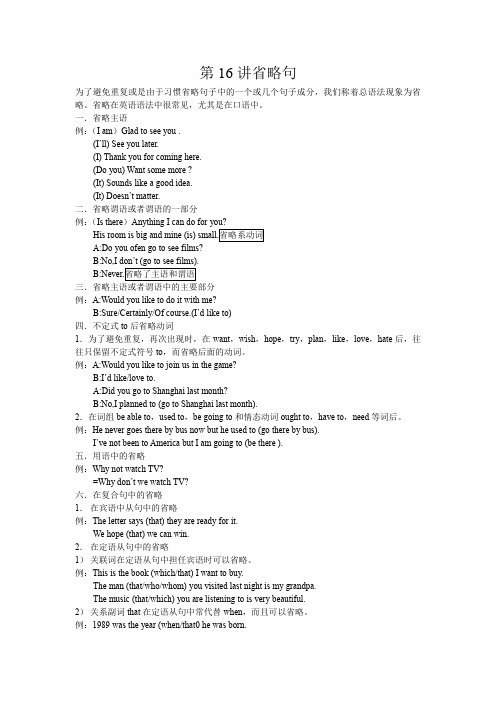
第16讲省略句为了避免重复或是由于习惯省略句子中的一个或几个句子成分,我们称着总语法现象为省略。
省略在英语语法中很常见,尤其是在口语中。
一.省略主语例:(I am)Glad to see you .(I’ll) See you later.(I) Thank you for coming here.(Do you) Want some more ?(It) Sounds like a good idea.(It) Doesn’t matter.二.省略谓语或者谓语的一部分例:(Is there)Anything I can do for you?A:Do you ofen go to see films?三.省略主语或者谓语中的主要部分例:A:Would you like to do it with me?B:Sure/Certainly/Of course.(I’d like to)四.不定式to后省略动词1.为了避免重复,再次出现时,在want,wish,hope,try,plan,like,love,hate后,往往只保留不定式符号to,而省略后面的动词。
例:A:Would you like to join us in the game?B:I’d like/love to.A:Did you go to Shanghai last month?B:No,I planned to (go to Shanghai last month).2.在词组be able to,used to,be going to和情态动词ought to,have to,need等词后。
例:He never goes there by bus now but he used to (go there by bus).I’ve not been to America but I am going to (be there ).五.用语中的省略例:Why not watch TV?=Why don’t we watch TV?六.在复合句中的省略1.在宾语中从句中的省略例:The letter says (that) they are ready for it.We hope (that) we can win.2.在定语从句中的省略1)关联词在定语从句中担任宾语时可以省略。
高中英语语法——省略句(26张PPT)

please.
的一部分)
A: Would you like to
come to the party? B: I’d love to (come the
party).
不定式后 省略动词
They do not visit their parents
as much as they ought to (visit
பைடு நூலகம்
— Well, her parents wouldn’t allow
her to go to the party, but she
still _____.
A. hopes to
B. hopes so
C. hopes not
D. hopes for
(江苏2017)
4. — Have you got any particular
You can borrow my first aid notes if you want to (borrow my first aid notes).
不定式后省略动词
7) Sounds like a good idea. (It) sounds like a good idea.
8) Anything I can do for you? (Is there) anything I can do for you?
5. Sorry to hear that. I’m sorry to hear that.
6. Pity you couldn’t come.
It’s/ What a pity you couldn’t come. 7. This way, please.
Step this way, please.
高中英语语法省略句与there be句型知识点讲解练习

高中英语语法省略句与there be句型知识点讲解练习考点清单1.省略句★宾语从句中的省略在两个或两个以上的并列宾语从句中,第一个连词that可省略,其余的则不可省略;在形容词sure,glad,certain,happy等后所接的宾语从句中,连词that可省略。
He said (that) he felt happy and that he decided to stay here another week.I am very happy (that) I have passed the driving test.★定语从句中的省略可以省略作宾语的关系代词。
The first thing (that) I’m going to do is take a long vacation!★状语从句中的省略在表示时间、条件、地点、比较、方式或让步的状语从句中,如果谓语动词是be,从句的主语和主句的主语一致,或主语是it时,常省略主语和部分谓语。
Once (they are) injured,they must be sent to hospital.Make some changes when (it is) necessary.The host of the meeting hurried away as if (he was) angry.2.there be句型★there be句型的时态变化There is a tall tree in front of the classroom.(一般现在时)There was a concert at the National Theatre last night.(一般过去时)There will be a meeting in the lecture room tomorrow morning.(一般将来时) He said that there was going to be an English contest the next Friday.(过去将来时)There have been no letters from my parents since I left home two years ago.(现在完成时)★there be句型的其他形式(1)There must be...肯定有……There ca n’t be...不可能有……(2)There may be...可能有……There used to be...曾经有过……(3)There must/may have been...肯定/可能已经有过……(4)There ought to be....应该有……(5)There be likely to be...可能有……(6)There happens/happened to be...碰巧有……(7) There appears/appeared/seems/seemed to be...似乎有……There may be/is likely to be a foreign film at the cinema this evening.There can be no doubt about this case.★there lie/exist...句型除了be以外,下列表示存在概念的不及物动词stand/lie/live/happen/remain/exist等,也可以用于there be句型。
高一英语省略句练习题40题含答案解析

高一英语省略句练习题40题含答案解析1. —Do you like apples? —Yes, I do. / No, I don't.答案解析:这是简单句中的省略回答。
省略了主语和谓语动词后的宾语“apples”。
语法规则是在简单句的回答中,可以省略与问句中重复的部分。
2. —Is she a teacher? —Yes, she is. / No, she isn't.答案解析:省略了主语和谓语动词后的表语“a teacher”。
语法规则同上。
3. —Can you swim? —Yes, I can. / No, I can't.答案解析:省略了主语和谓语动词后的宾语( 无具体宾语,省略了动作对象)。
语法规则同上。
4. —Have you seen the movie? —Yes, I have. / No, I haven't.答案解析:省略了主语和谓语动词后的宾语“the movie”。
语法规则同上。
5. —Does he like music? —Yes, he does. / No, he doesn't.答案解析:省略了主语和谓语动词后的宾语“music”。
语法规则同上。
6. —Are you happy? —Yes, I am. / No, I'm not.答案解析:省略了主语和谓语动词后的表语“happy”。
语法规则同上。
7. —Should we go now? —Yes, we should. / No, we shouldn't.答案解析:省略了主语和谓语动词后的宾语( 无具体宾语,省略了动作对象)。
语法规则同上。
8. —Must I finish the work today? —Yes, you must. / No, you needn't.答案解析:省略了主语和谓语动词后的宾语“the work”和时间状语“today”。
超全的英语省略句练习含答案

高中英语省略句专练综合专练:1.The boy wanted to ride his bike in the street, but his mother told him _____.A. not toB. not to doC. not do itD. do not to2.The traditional goal of science is to discover how things are, not how they ought ____.A. toB. to beC. beD. have been3.---Did you work in the lab every afternoon---No, but sometimes, I wish I ____.A. had time toB. had time to doC. have time toD. have time4.---I hope the children won’t tou ch the dog.----I’ve warned them ____.A. notB. not toC. not touchD. not do5.Some students are going to China in summer vacation, and ____.A.some are to AmericaB. some going to AmericaC. some to AmericaD. some America6.The workers did all ___ good care of the old man.A. they could to takeB. they could takeC. which they could to takeD. what they could to take7.Of all the things in the world, I think life and love are ____.A.very much preciousB. more than preciousC. the preciousestD. the most precious8.The photographs of other planets taken by satellite are clear than ___.A. the earthB. those taken from the earthC. those of the earthD. of the earth9.why ___ It is not very serious.A. to worryB. worryC. not worryD. you are worried10.___ the road, don’t forget to look both ways.A. As crossingB. While you crossC. While crossingD. Cross11.Chemistry is the science of substances ___ the science of energy.A. and is physicsB. or is physicsC. and physicsD. or physics is12. –Who broke the window--- ____.A. HimB. HeC. He brokeD. It is him13.---Susan, go and join your sister cleaning the yard.--- Why ___ John is sitting there doing nothing.A. himB. heC. ID. me14.---How do you find your missing pen----___.A.Quite by accidentB. I found it in my drawer.C. It writes wellD. It was well kept by myself.15.---You must obey every word of mine.----____ I don’t.A. How ifB. What ifC. Such asD. Only if16.When ___, the museum will be open to the public next year.A. completedB. completingC. being completedD. to be completed17. The man we followed suddenly stopped and looked as if ____ whether he was going in the right direction.A. seeingB. having seenC. to have seenD. to see18.I won’t go to his party next time. It couldn’t have been ____ in fact.A. any betterB. any worseC. so badD. the best19. ---Does Bill do his new job well---_____ his old job. I am afraid there is no hope for him.A. Not better thanB. No better thanC. Not so well asD. Not as well as20.---Leaving for Shanghai---____.A. SoonB. LatelyC. The other dayD. Sooner21.The rent is expensive. I’ve got half the space I had at home and I’m paying ____here.A. as three times muchB. as much three timesC. much as three timesD. three times as much22. —Wait until we get a satisfactory one, will you---I couldn’t agree ___, It sounds good to me.A. muchB. worseC. moreD. at all23. ——I’ll be away on a business tri p. Would you mind looking after my cat——Not at all. ______________.A. I’ve no timeB. I’d rather notC. I’d like itD. I’d be happy to24. ——Let me introduce myself. I’m Albert.——____________.A.What a pleasureB. It’s my pleasureC. P leased to meet youD. I’m very pleased25. ——Do you mind my taking this seat——__________.A. Yes, sit downB. No, of course notC. Yes, take it pleaseD. No, you can’t take it26. ——I usually go there by train.——Why not _____by boat for a changeA. to try goingB. trying to goC. to try and goD. try going27. Unless________ to speak, you should remain silent at the conference.A. invitedB. invitingC. being invitedD. having invited28. Though_______ money, his parents managed to send him to university.A. lackedB. lacking ofC. lackingD. lacked in29. The research is so designed that once _____nothing can be done to change it..A.begins B having begun C. beginning D. begun30. The man we followed suddenly stopped and looked as if________ whether he was going in the rightdirection.A. seeingB. having seenC. to have seenD. to see31. ______, he doesn’t want to go to school and keep in touch with the bad boys.A. As he is a studentB. He is as studentC. Student as he isD. As students he is32. ——The boys are not doing a good job at all, are they——_________.A. I guess not soB. I don’t guessC. I don’t guess soD. I guess not33. In a way, I think we both won: I the game, but cousin Ed my ______.A.friendshipB. respectC. supportD. favor34. — I hate talking with that guy. Look, he is coming. What should I do—Don’t speak until _____.A. speakingB. spoken toC. spokenD. speaking to35. — How are you getting on with your work—Oh, I’m sorry. Things aren’t going so well as _____.A. plansB. planningC. plannedD. to plan36. He is only too ready to help others, seldom, _____, refusing them when they turn to him.A. if neverB. if everC. if notD. if any37. While _____ holding talks with President Hu Jintao, US President George W. Bush thanked China for its important role in the Six-Party Talks.A. he isB. he wasC./D. B or C38. —You should have thanked her before you left.—I meant _____, but when I was leaving I couldn’t find her anywhereA. to thankB. toC. /D. thanking39. When first _____ to the market, these products enjoyed great success.A. introducingB. introducedC. introduceD. being introduced40. I wonder why you won't do it as _____. It's the third time you have done so.A. told toB. be toldC. told youD. you told41. He is rather difficult to make friends with, but his friendship, _____ is more true than anyother.A. once gainedB. when to gainC. after is gainedD. while gaining42. You may take them all home _____.A. if possibleB. if canC. if impossibleD. if you are possible43. Water, _____ enough, can change into vapor quicklyA. when heatedB. while heatingC. when to be heatedD. when is heated44. —Should I look up each word that I don’t understand— No, turn to your dictionary only when _____.A. you are necessaryB. you needC. necessaryD. you are needed45. — You seem to have lost your way. _____— I'm looking for Wangfujing Street.A. What forB. Need helpC. Why soD. Where to高考题链接及能力拓展训练:1. When first ________ to the market, these products enjoyed great success. (NMET 2004全国卷II)A. introducingB. introducedC. introduceD. being introduced2. It shames me to say it, but I told a lie when ________ at the meeting by my boss. (NMET 2004全国卷IV)A. questioningB. having questionedC. questionedD. to be questioned3. The man we followed suddenly stopped and looked as if ________ whether he was going in the right direction. (NMET 2003 安徽春)A. seeingB. having seenC. to have seenD. to see4. Generally speaking, ________ according to the directions, the drug has no side effect. (NMET2003上海卷)A. when takingB. when takenC. when to takeD. when to be taken5. Unless ________ to speak, you should remain silent at the conference. (NMET 2003上海春)A. invitedB. invitingC. being invitedD. having invited6. When ________ , the museum will be open to the public next year. (NMET 2002上海春)A. completedB. completingC. being completedD. to be completed7. Though ________ money, his parents man-aged to send him to university. (NMET 2002上海卷)A. lackedB. lacking ofC. lackingD. lacked in8. The research is so designed that once ________ nothing can be done to change it. (NMET 2002)A. beginsB. having begunC. beginningD. begun9. -You 're always working. Come on, let's go shopping.- ________ you ever want to do is going shopping. (NMET 2002北京、安徽、内蒙古春)A. AnythingB. SomethingC. AllD. That10. Is this the reason ________ at the meeting for his carelessness in his work(NMET 2002上海春)A. he explainedB. what he explainedC. how he explainedD. why he explained11. What surprised me was not what he said but ________ he said it. (NMET 2004湖北卷)A. the wayB. in the way thatC. in the wayD. the way which12. It is easy to do the repair. ________ you need is a hammer and some nails. (NMET 2004天津卷)A. SomethingB. AllC. BothD. Everything13. That's an unpleasant thing to say about your father after ________ he's done for you. (NMET 2004全国卷)A. somethingB. anythingC. allD. that14. As you've never been there before, I'll have someone ________ you the way. (MET 1990上海卷)A. to showB. showC. showingD. showed15. -I'll be away on a business trip. Would you mind looking after my cat-Not at all, ________ . (NMET 1995)A. I have no timeB. I'd rather notC. I'd like itD. I'd be happy to16. -Does your brother intend to study German-Yes, he intends ________ . (NMET 1998上海卷)A. /B. toC. soD. that17. -Would you like to go to the Grand Theatre with me tonight- ________ . (NMET 1999上海卷)A. Yes, I'd like to go to the Grand TheatreB. I'd like to, but I have an exam tomorrowC. No, I won'tD. That's right18. -You should have thanked her before you left.-I meant ________ , but when I was leaving I couldn't find her anywhere. (NMET 2000北京春招卷)A. to doB. toC. doingD. doing to19. ________ it rain tomorrow, we would have to put off the visit to the Yangpu Bridge. (NMET 1994上海卷)A. WereB. ShouldC. WouldD. Will20. ________ for the free tickets, I would not have gone to the films so often. (NMET 1995上海卷)A. If it is notB. WereC. Had it not beenD. If they were not21. I will know what was on his mind at the time, nor will ________ . (NMET 2004 江苏卷)A. anyoneB. anyone elseC. no oneD. no one else22. Of the making of good books there is no end; neither ________ any end to their influence on man's lives. (NMET 2004 广东卷)A. there isB. there areC. is thereD. are there23. -I would never come to this restaurant again. The food is terrible!- ________ . (NMET 2004全国卷III)A. Nor am IB. Neither would IC. Same with meD. So do I。
高一英语省略句运用实例练习题30题
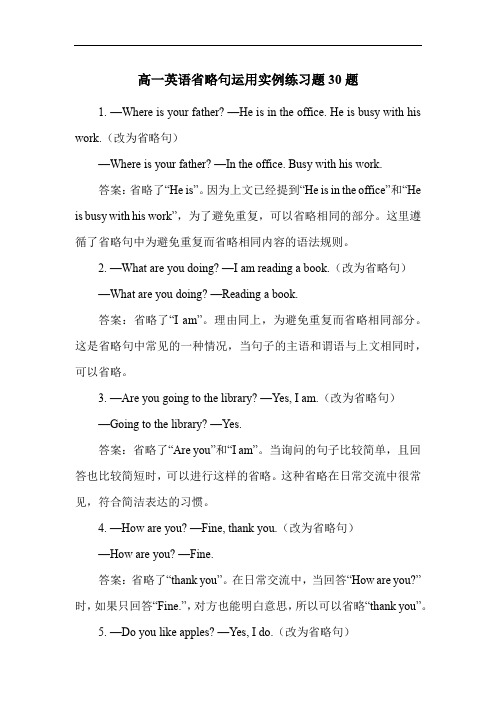
高一英语省略句运用实例练习题30题1. —Where is your father? —He is in the office. He is busy with his work.(改为省略句)—Where is your father? —In the office. Busy with his work.答案:省略了“He is”。
因为上文已经提到“He is in the office”和“He is busy with his work”,为了避免重复,可以省略相同的部分。
这里遵循了省略句中为避免重复而省略相同内容的语法规则。
2. —What are you doing? —I am reading a book.(改为省略句)—What are you doing? —Reading a book.答案:省略了“I am”。
理由同上,为避免重复而省略相同部分。
这是省略句中常见的一种情况,当句子的主语和谓语与上文相同时,可以省略。
3. —Are you going to the library? —Yes, I am.(改为省略句)—Going to the library? —Yes.答案:省略了“Are you”和“I am”。
当询问的句子比较简单,且回答也比较简短时,可以进行这样的省略。
这种省略在日常交流中很常见,符合简洁表达的习惯。
4. —How are you? —Fine, thank you.(改为省略句)—How are you? —Fine.答案:省略了“thank you”。
在日常交流中,当回答“How are you?”时,如果只回答“Fine.”,对方也能明白意思,所以可以省略“thank you”。
5. —Do you like apples? —Yes, I do.(改为省略句)—Like apples? —Yes.答案:省略了“Do you”和“I do”。
高一英语省略句练习题40题(答案解析)

高一英语省略句练习题40题(答案解析)1.When necessary, I will help you.A.When I am necessaryB.When it is necessaryC.When is necessaryD.When are necessary答案解析:B。
这句话省略了主语和be 动词。
完整的句子是“When it is necessary, I will help you.”,这里的“it”指代后面的事情,在从句中可以省略主语和be 动词。
2.If possible, he will come to see us.A.If he is possibleB.If it is possibleC.If is possibleD.If are possible答案解析:B。
省略了主语和be 动词。
完整句子是“If it is possible, he will come to see us.”,“it”在这里指代后面的事情,在从句中可省略主语和be 动词。
3.While studying, he listens to music.A.While he is studyingB.While is studyingC.While are studyingD.While they are studying答案解析:A。
省略了主语和be 动词。
完整句子是“While he is studying, he listens to music.”,主语是“he”,在从句中可省略主语和be 动词。
4.When in trouble, ask for help.A.When you are in troubleB.When he is in troubleC.When she is in troubleD.When it is in trouble答案解析:A。
省略了主语和be 动词。
完整句子是“When you are in trouble, ask for help.”,这里默认是“你”在困境中,在从句中可省略主语和be 动词。
高考英语省略句讲解课件
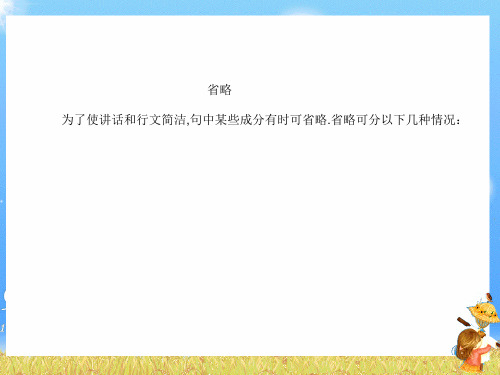
• He failed <in> the game.
• The war lasted <for> four years. 但在句首或与walk等连用不可省
• Come and see me <at> any time you like. <in, on, at, by>
• He stayed <at> home all day. • He walked <for > three li. <表示距
not only… but <also>…, whether… <or not>,
so <that>
9、情态动词should的省略 insist, order, command, suggest, propose,
advise, demand, require, request, ask. It’s necessary/important/impossible/strange / natural/a pity…
why? ②在I’m afraid, I think, I believe, I hope,
I guess 等作答句,后面常用省略形式.
--- Do you think it will rain?
--- I guess so.
常用表达 I hope so. 我希望这样. I hope not 我不希望这样. I’m afraid so/not. 我恐怕如此/不如此 I think/believe/guess /expect /imagine
Tom plays football as well as, if not better than, Jack. <=Tom plays football as well as Jack does, if he doesn’t play better than Jack does.> We should think more of our class than of ourselves. I’m taller than she <is>. You hate him as much as I <hate him>
高中英语语法加练习大全: 省略句
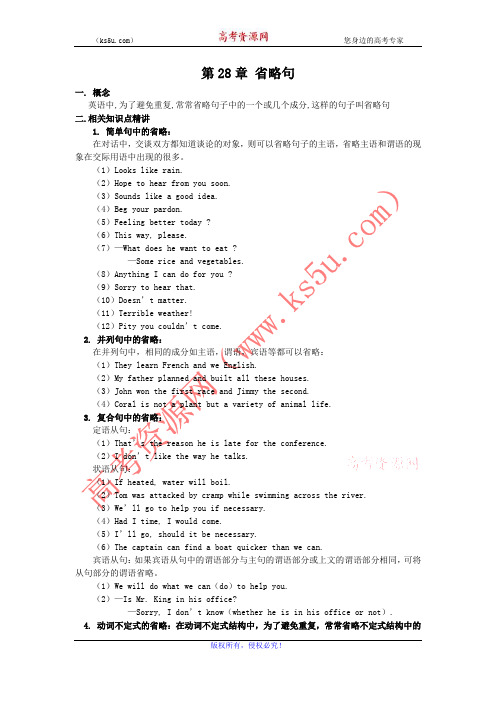
第28章省略句一. 概念英语中,为了避免重复,常常省略句子中的一个或几个成分,这样的句子叫省略句二.相关知识点精讲1. 简单句中的省略:在对话中,交谈双方都知道谈论的对象,则可以省略句子的主语,省略主语和谓语的现象在交际用语中出现的很多。
(1)Looks like rain.(2)Hope to hear from you soon.(3)Sounds like a good idea.(4)Beg your pardon.(5)Feeling better today ?(6)This way, please.(7)—What does he want to eat ?—Some rice and vegetables.(8)Anything I can do for you ?(9)Sorry to hear that.(10)Doesn’t matter.(11)Terrible weather!(12)Pity you couldn’t come.2. 并列句中的省略:在并列句中,相同的成分如主语,谓语,宾语等都可以省略:(1)They learn French and we English.(2)My father planned and built all these houses.(3)John won the first race and Jimmy the second.(4)Coral is not a plant but a variety of animal life.3. 复合句中的省略:定语从句:(1)That’s the reason he is late for the conference.(2)I don’t like the way he talks.状语从句:(1)If heated, water will boil.(2)Tom was attacked by cramp while swimming across the river.(3)We’ll go to help you if necessary.(4)Had I time, I would come.(5)I’ll go, should it be necessary.(6)The captain can find a boat quicker than we can.宾语从句:如果宾语从句中的谓语部分与主句的谓语部分或上文的谓语部分相同,可将从句部分的谓语省略。
2024届高考英语语法省略句讲解,练习及解析课件(共14张PPT)
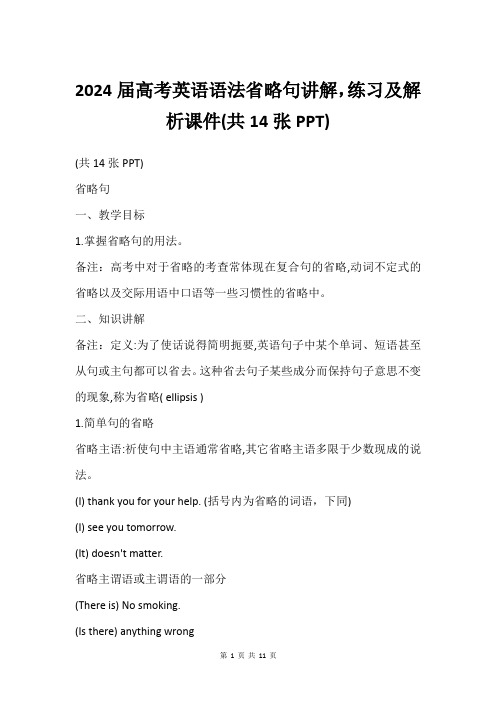
2024届高考英语语法省略句讲解,练习及解析课件(共14张PPT)(共14张PPT)省略句一、教学目标1.掌握省略句的用法。
备注:高考中对于省略的考查常体现在复合句的省略,动词不定式的省略以及交际用语中口语等一些习惯性的省略中。
二、知识讲解备注:定义:为了使话说得简明扼要,英语句子中某个单词、短语甚至从句或主句都可以省去。
这种省去句子某些成分而保持句子意思不变的现象,称为省略( ellipsis )1.简单句的省略省略主语:祈使句中主语通常省略,其它省略主语多限于少数现成的说法。
(I) thank you for your help. (括号内为省略的词语,下同)(I) see you tomorrow.(It) doesn't matter.省略主谓语或主谓语的一部分(There is) No smoking.(Is there) anything wrongWhy (do you) not say hello to him省略作宾语的不定式短语,只保留to--- Are you going there--- I'd like to (go there).He did not give me the chance, though he had promised to (give me the chance),注意:如果该宾语是be动词或完成时态,则须在to之后加上be或have. --- Are you an engineer--- No, but I want to be.--- He hasn't finished the task yet. --- Well, he ought to have.省略表语---- Are you thirsty--- Yes, I am (thirsty).同时省略几个成分Let's meet at the same place as (we met) yesterday.-- Have you finished your work--- (I have) Not (finished my work) yet.2.并列句中的省略两个并列分句中,后面分句中与前面分句中相同的部分,常可省略,以避免重复。
- 1、下载文档前请自行甄别文档内容的完整性,平台不提供额外的编辑、内容补充、找答案等附加服务。
- 2、"仅部分预览"的文档,不可在线预览部分如存在完整性等问题,可反馈申请退款(可完整预览的文档不适用该条件!)。
- 3、如文档侵犯您的权益,请联系客服反馈,我们会尽快为您处理(人工客服工作时间:9:00-18:30)。
高中英语省略句讲练为了使话说得简明扼要,英语句子中某个单词、短语甚至从句或主句都可以省去。
这种省去句子某些成分而保持句子意思不变的现象,称为省略(ellipsis)种类例句说明主语的省略Beautiful day (= It is abeautiful day, isn’t it?Pity we live so far from thesea. (It is a pity we live so farfrom the sea.有时也可省略整个句子的主语和谓语,只保留次要成分。
She was poor but (shewas honest.--Did you knowanything about theaccident?--Not until you told me.(= I didn’t knowanything about it untilyou told me.谓语的省略--what do you think madeMary so upset?--Losing her new bicycle (made Mary so upset.状语从句的省略Seen from the plane (when itis seen from the plane, thehouse looks like tiny toys.If (it is possible, I’ll go therewith you.注意状语从句中的主语同主句主语的一致性。
不定式的省略The boy wanted to ride hisbicycle in the street, but hismother told him not to. (not toride his bicycle in the street.--Alice, why didn’t you comeyesterday?--I was going to (comeyesterday, but I had anunexpected visitor.若不定式后面是完成时,省略时应保留have;不定式后含有动词be的结构时,也要保留be动词。
--Did you tell him thenews?--I ought to have (toldhim the news, but Ididn’t know how tospeak.--Are you an engineer?--No, but I want to be.Ⅰ、状语从句中的省略用法一、如果从句的主语和主句的主语一致,且从句的谓语含有be动词的某种形式(am/is/are/was/were),可同时省略从句的主语和be动词的某种形式。
1、 when,while引导的时间状语从句e.g. Do be careful when (you are crossing the street.When/While (I was on my way to work, I met her.2、 if,unless,once引导的条件状语从句e.g. If (it is properly treated, waste will do no harm to the environment.I’ll not go to the party unless (I am invited.Once (you are caught stealing in a supermarket, you will be punished.3、 though,although,whether,no matter whether/what/how/who等引导的让步状语从句e.g. He was happy, though/although (he was poor.Whether (she is sick or well, she is always cheerful.No matter how/However hard the task (is, we must fulfill it in time.(注:从句的主语和主句的主语不一致时,只省略从句中的be动词形式)4、 as if,as though引导的方式状语从句e.g. He rubbed his eyes and yawned as if/though (he was waking up after a long sleep.He stood up as if/though (he wanted to leave.(as if/though + to do表示一个将来的动作)二、 than,as引导的比较状语从句中的省略用法:当不同的主语进行比较时,一般省略从句中的谓语;当从句中的主语与谓语(be动词除外)和主句中的主语与谓语相同时,通常省略从句中的主语和谓语,只保留比较部分。
e.g. He is taller than his brother (is.I have as much as confidence in you as (I have confidence in him.三、以if从句为代表的状语从句中的特殊省略用法:通常省略了it is,that is,there is/are。
e.g. If (it is possible/necessary, this old temple will be rebuilt.If (that is so, I will call you back at 5:00 pm.There are only a few books in our school library, if (there are any.Ⅱ、定语从句中的省略用法关系词的省略关系代词that,which,whom等在限制性定语从句中充当宾语且不位于介词之后时,可以省略;in which或that在先行词way后作方式状语从句时可省略。
e.g. The man (that/who/whom you visited last night is my grandpa.I don’t like the way (in which/that you treat the girl.Ⅲ、虚拟语气中if及should的省略1、当条件状语从句中有were,had,should等时省略if,把它们提至句首,形成倒装句。
e.g. If I were a teacher, I would be strict with my students.= Were I a teacher, I would be strict with my students.2、 Suggest,insist,order,require等表示建议、要求、命令的动词后接的从句中,谓语动词常用“should+动词原形”,should可以省略。
e.g. The doctor suggested that he (should try to lose weight.Ⅳ、不定式符号to的省略1、感官动词see,hear,feel,watch等和使役动词have,make,let等后接不定式作宾语时,不定式省略to。
(一感feel,二听hear, listen to, 三让have, let, make,四看see, look at, observe, watch2、 do nothing but,can’t help but等结构常接省略to的不定式。
E.g. We didn’t do anything but stay at home watching TV yesterday.Hearing the news, she couldn’t help but cry.3、在特定语境中为了避免重复,当不定式再次出现时,在want,wish,hope,try,plan,like,love,hate后往往只保留to,而省略后面的动词。
但不定式后有be,have时,也保留be和have。
E.g. My parents encouraged me to go to college, but I didn’t want to.Ⅴ、So和not的替代性省略用于避免重复前面所说过的内容,替代词so/not替代肯定或否定的名词性从句。
可与believe,do,expect,fear,guess,hope,say,speak,suppose,think,I’m afraid 等连用e.g. – Do you suppose he is going to attend the meeting? – I suppose not.Ⅵ、日常交际中的省略在情景会话中,答语常常省略不会引起歧义的主语、谓语或宾语部分,而只保留对方希望了解的内容。
在复合句或并列句中,也有省略主、谓、宾的情况。
e.g. – How many copies do you want? -- (I want Three copies, please.-- Have you ever been to the Great Wall? -- No, (I have never (been to the Great Wall.随讲随练1、—Lucy,could you please spare me a few minutes?—____,but I hope "a few minutes" won't turn into a few hours.A. It doesn't matterB. That's kind of youC. I'm afraid notD. I guess so2、—Hey,taxi!—_____—I want to go to the dentist's.A. Good morning, sir.B. Nice to see you, sir.C. Where to, sir?D. What are you going to do, sir?3、The doctor expresses his strong desire that the patient _____ immediately.A. be operated onB. operated onC. was operated onD. would be operated on4、When he came back, he found the bag he had ____ over the seat was gone.A. left to hangB. left hangingC. left hungD. to leave hanging5、Liu Xiang spoke slowly to the Special Olympic competitors so as to have them____.A. understand himB. to be understoodC. be understoodD. to understand him6、—Are there any English story books for us students in the library?—There are only a few, ____.A. if anyB. if haveC. if someD. if has8、—Does Betty know where her violin is?—She saw somebody walking off with one, but she doesn't know____.A. whoseB. itC. whomD. which9、—Aren't you the manager?—No, and I ____.A. don't wantB. don't want toC. don't want to beD. don't10、—How are you getting on with your work?—Oh, I'm sorry. Things aren't going so well as____.A. plansB. planningC. plannedD. to plan11、—What's the matter with you?—I didn't pass the test, but I still____.A. hope soB. hope toC. hope itD. hope that12、The doctor did what he could ___ the boy, but in vain.A. saveB. to saveC. savingD. saved13、—You look happy today, Mary.—I like my new dress and Mother ___, too.A. likesB. doesC. isD. do14、—What happened to the boy? He was making so much noise. —He wanted to play football, but his mother warned him ____.A. notB. toC. not toD./15、____ for your brother, I would not have gone to see Mr. Wang.A. If it is notB. Were it notC. Had it not beenD. If they were not省略句练习1. When first ________ to the market, these products enjoyed great success. (NMET 2004全国卷IIA. introducingB. introducedC. introduceD. being introduced2. It shames me to say it, but I told a lie when ________ at the meeting by my boss. (NMET 2004全国卷IVA. questioningB. having questionedC. questionedD. to be questioned3. The man we followed suddenly stopped and looked as if ________ whether he was going in the right direction. (NMET 2003 安徽春A. seeingB. having seenC. to have seenD. to see4. Generally speaking, ________ according to the directions, the drug has no side effect. (NMET2003上海卷A. when takingB. when takenC. when to takeD. when to be taken5. Unless ________ to speak, you should remain silent at the conference. (NMET 2003上海春A. invitedB. invitingC. being invitedD. having invited6. When ________ , the museum will be open to the public next year. (NMET 2002上海春A. completedB. completingC. being completedD. to be completed7. Though ________ money, his parents man-aged to send him to university. (NMET 2002上海卷A. lackedB. lacking ofC. lackingD. lacked in8. The research is so designed that once ________ nothing can be done to change it. (NMET 2002A. beginsB. having begunC. beginningD. begun9. —You 're always working. Come on, let's go shopping.— ________ you ever want to do is going shopping. (NMET 2002北京、安徽、内蒙古春A. AnythingB. SomethingC. AllD. That10. Is this the reason ________ at the meeting for his carelessness in his work?(NMET 2002上海春A. he explainedB. what he explainedC. how he explainedD. why he explained11. What surprised me was not what he said but ________ he said it. (NMET 2004湖北卷A. the wayB. in the way thatC. in the wayD. the way which12. It is easy to do the repair. ________ you need is a hammer and some nails. (NMET 2004天津卷A. SomethingB. AllC. BothD. Everything13. That's an unpleasant thing to say about your father after ________ he's done for you. (NMET 2004全国卷A. somethingB. anythingC. allD. that14. As you've never been there before, I'll have someone ________ you the way. (MET 1990上海卷A. to showB. showC. showingD. showed15. —I'll be away on a business trip. Would you mind looking after my cat?—Not at all, ________ . (NMET 1995A. I have no timeB. I'd rather notC. I'd like itD. I'd be happy to16. —Does your brother intend to study German?—Yes, he intends ________ . (NMET 1998上海卷A. /B. toC. soD. that17. —Would you like to go to the Grand Theatre with me tonight?— ________ . (NMET 1999上海卷A. Yes, I'd like to go to the Grand TheatreB. I'd like to, but I have an exam tomorrowC. No, I won'tD. That's right18. —You should have thanked her before you left.—I meant ________ , but when I was leaving I couldn't find her anywhere. (NMET 2000北京春招卷A. to doB. toC. doingD. doing to19. ________ it rain tomorrow, we would have to put off the visit to the Yangpu Bridge. (NMET 1994上海卷A. WereB. ShouldC. WouldD. Will20. ________ for the free tickets, I would not have gone to the films so often. (NMET 1995上海卷A. If it is notB. WereC. Had it not beenD. If they were not21. I will know what was on his mind at the time, nor will ________ . (NMET 2004 江苏卷A. anyoneB. anyone elseC. no oneD. no one else22. Of the making of good books there is no end; neither ________ any end to their influence on man's lives. (NMET 2004 广东卷A. there isB. there areC. is thereD. are there23. —I would never come to this restaurant again. The food is terrible!— ________ . (NMET 2004全国卷IIIA. Nor am IB. Neither would IC. Same with meD. So do IKeys:1—5 BCDBA 6—10 AADCA 11—15 AACBD 16—20 BBBBC 21—23 BCB。
